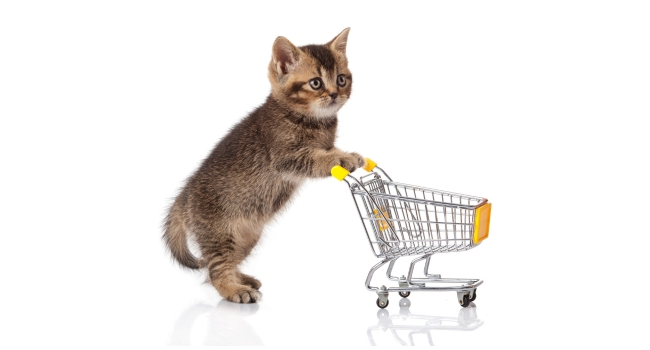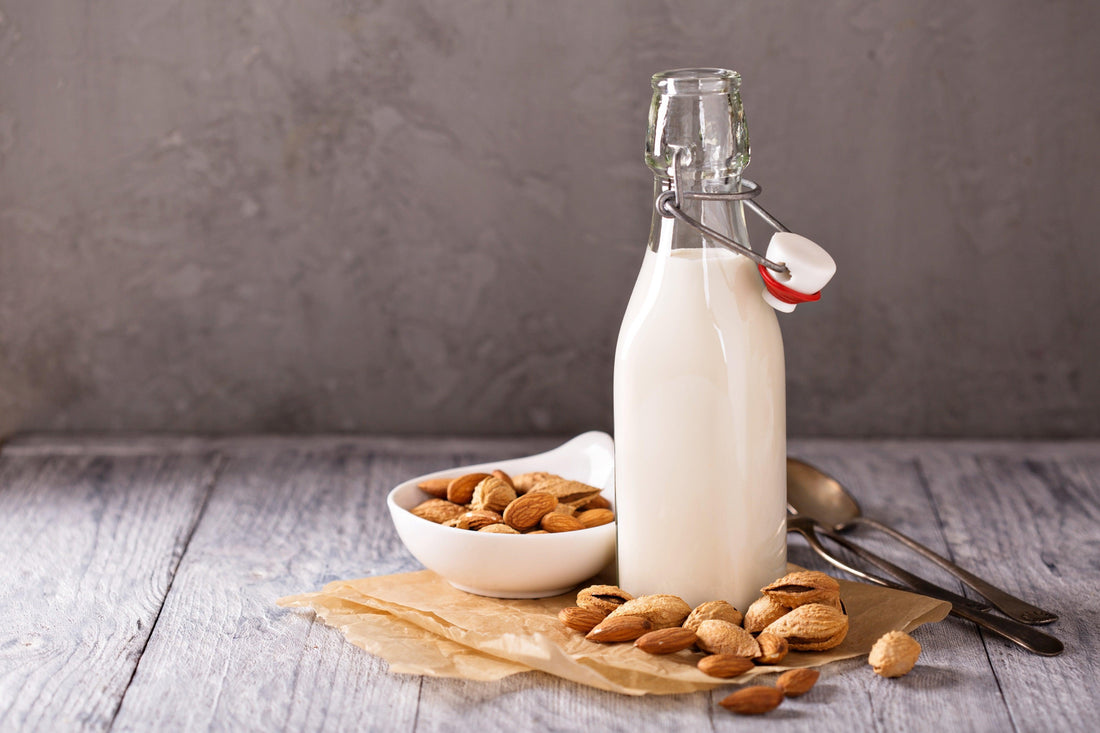For example, can cats have almond milk?
Almond milk offers many benefits that cats can take advantage of in the same way that humans do, although there are several other factors to consider before feeding this nut-based milk to your furry friend.
Here’s what you need to know about giving your cat almond milk!
What Exactly is Almond Milk?
Almond milk is a dairy alternative that is made from ground almonds and water. Almond milk comes in both sweetened and unsweetened varieties, depending on personal preference.
The unsweetened variety is typically used for cereal or for making cream sauces or soups.
The sweetened variety can be used as a base for many of your favorite coffee drinks including lattes, frappuccinos, and mochas.
Almond milk has been traditionally consumed by those who suffer from lactose intolerance or those who follow a vegan diet, as it contains no animal products whatsoever.
Can Cats Have Almond Milk?
The answer is yes but only in moderation! Almond milk is lactose-free so it is safe for cats to consume and it can be given as an occasional treat to your cat.
But keep in mind cats require their own proper diet and replacing their food with almond milk can lead to certain health concerns and diet-related issues which may lead to developing poor eating habits in the long run.
The Benefits of Almond Milk for Cats
Almond milk can be beneficial for your furry friend. Almond milk is a great alternative to cow’s milk because it is lower in lactose and cholesterol.
Almond milk contains a great deal of calcium, which is important for your cat. It is also high in vitamin D and E, which are helpful nutrients to maintain strong bones and promote good skin health.
Additionally, it has a high amount of other minerals such as potassium, and magnesium which are all essential nutrients for cats.
But as with anything your cat consumes, it is best to consult with a veterinarian before introducing any new food or drink into their diet.
Are There Any Risks Associated With Feeding Your Cat Almond Milk?
There is no doubt that almond milk is safe for cats, but there are still some risks associated with it. Too much almond milk can cause the following risks to your cat:
- Nutritional Deficiency
- Filled With Harmful Artificial Ingredients
- Gastrointestinal Problems
- High in Calories
- Allergic Reaction
1. Nutritional Deficiency
Cats need a diet that is high in protein and fat and low in carbohydrates and fiber. Almond milk does not provide these needs as it is low in both protein and fat.
Cats need more than 50% protein in their diet, so plant-based products are not suitable.
Therefore, almond milk can lead to nutritional deficiencies such as anemia or weight loss which can cause other complications such as abortion in your cat.
2. Filled With Harmful Artificial Ingredients

Pet owners who choose to give their pet almond milk need to be aware that almond milk is not a healthful alternative for felines.
The ingredients in almond milk can be harmful to cats, and store-bought almond milk often contains artificial sweeteners, preservatives, and other chemicals.
Your pet should never consume anything containing artificial sweeteners such as xylitol and sorbitol.
3. Gastrointestinal Problem
Consumption of almond milk in excess can upset your cat's stomach and cause gastrointestinal problems, especially if your cat is suffering from chronic digestive problems such as inflammatory bowel disease (IBD).
Your cat may experience the following symptoms:
- Diarrhea
- Fever
- Lethargy
- Dehydration
- Anorexia (loss of appetite)
- Abdominal pain
4. High in Calories
It is not safe for cats to drink almond milk because it is extremely high in calories. A cup of almond milk can contain anywhere from 30 to 60 calories, which can increase the risk of obesity and diabetes.
Plus, eating too many high-calorie foods puts a lot of strain on a cat's pancreas and could cause pancreatitis which is dangerous.
5. Allergic Reaction
Some cats may be sensitive to new food such as almond milk, which can lead to an allergic reaction that includes symptoms like diarrhea or vomiting.
The most common symptom of an allergic reaction includes the:
- Runny nose
- Swollen eyes
- Diarrhea
- Itchy skin
- Unnatural stool
- Vomiting
- Coughing or wheezing
The possibility exists that your cat may react this way to almond milk, so always consult your veterinarian before feeding your cat any plant-based products.
What to Do if Your Cats Show Allergic Symptoms?
If your cat is showing symptoms like vomiting, runny nose, or seizures, contact your veterinarian immediately.
These can be symptoms of an allergic reaction to a food ingredient. For a less serious case of digestive upset (e.g., diarrhea), try feeding your cat some chicken soup until they recover.
If you're worried about how long it will take for symptoms to go away, keep in mind that when it comes to allergies, they can take anywhere from 24 hours to two weeks to resolve completely.
Are Kittens Able to Consume Almond Milk in Place of Milk Replacement?
Kittens should be fed exclusively on their mother’s milk or kitten milk replacer (KMR) until they are old enough to eat solid foods. KMR is specially formulated to provide all of the nutrients that a kitten needs.
Almond milk or plant-based products can be harmful to a kitten’s sensitive stomach and it is also high in fiber which is dangerous for kittens.
Almond milk has been known to cause diarrhea and vomiting that can lead to death in kittens who drink it as a milk replacement.
Are Other Plant-Based Milk Alternatives Better?

Let’s see if other plant-based milk substitutes are suitable for cats instead of almond milk:
- Soya milk
- Rice milk
- Coconut milk
1. Soya Milk
Cats shouldn't drink soya milk because it contains complex carbohydrates they can't digest, and it's also high in calories.
A cat could consume 200+ calories in one day by drinking two cups of soya milk alone.
Your pet's teeth or digestive system can also suffer from soya milk consumption, so be sure to avoid giving your furry friend any soya milk at all!
2. Rice Milk
Some pet parents may find it tempting to give their cats some rice milk, but this can be very dangerous for them. Rice milk has lots of carbohydrates which is bad for a cat's health.
Cats that drink rice milk may experience allergic reactions or digestive distress, so it is best to avoid feeding your cat rice milk at all costs.
3. Coconut Milk
Your cat should not consume coconut milk because it contains high amounts of saturated fats. There are some unpleasant side effects associated with drinking this milk, such as vomiting and diarrhea. Therefore, it is in your and your pet's best interest that you avoid feeding coconut milk to your cat.
How Much Almond Milk Can Cats Have?
If you want to share almond milk with your cat, give him/her one tablespoon once a day as a special treat. According to veterinarians, treats should only make up 4 to 10% of your furry friend's diet. Ensure they don't receive too much from you.
How Often Can a Cat Have Almond Milk?
It is advised to only give a cat almond milk once or twice a week. Most cats may be able to drink it without any side effects, but some will still experience issues like diarrhea, stomach pain, and vomiting.
If your cat has a sensitive stomach then you should steer clear of giving them any dairy or plant-based products at all.
Are There Any Healthier Alternatives to Almond Milk?
Protein snacks like small bits of cooked chicken or a small serving of tuna will provide your cat with nutritional benefits without any risk.
There are a lot of protein snacks available to choose from:
- Tuna
- Chicken
- Cooked eggs
- Sardines
- Lean beef
- Lamb
- Shrimps and prawns
- Salmon
- Mackerel
What Other Foods Should I Avoid Feeding My Cat?

For people that want to share their food with their cat, make sure to give your cat healthy human snacks instead of snacks that may harm them.
Foods you should avoid giving your cat include:
- Alcohol
- Citrus fruits
- Coffee
- Coconut
- Grapes and raisins
- Dairy products
- Mushrooms
- Raw bread containing yeast
- Onions, garlic, leeks, chives, scallions, and shallots
Key Takeaways
- In moderation, cats can consume almond milk.
- The consumption of almond milk is not recommended for kittens, senior cats, or cats with chronic diseases.
- Excessive consumption of almond milk can cause gastrointestinal problems in cats.
- Allergic reactions to almond milk are infrequent, but they can occur.
- It is best to consult your veterinarian before giving your cat any new food item.
Pro Tip:
It can be very stressful and concerning when a beloved pet is not feeling well, so it's worth it to get pet insurance to make sure you can cover the veterinary bills.
Importance of Pet Insurance
Pet insurance is a great way to protect your animal's health. It can be hard to predict when an accident will happen, but with pet insurance, you're covered.
There are a few different types of plans depending on your needs, and it only takes minutes to get coverage for your pet.
Some pet insurance companies will even cover 100% of veterinary expenses. So make sure to choose the best pet insurance plan for your furry friend.
Once you have a plan in place, vet bills will never be too high because they'll already be covered by the policy.
It's important that we all take care of our animals' safety and well-being so they can enjoy their lives just as much as we do ours.
What Makes Genius Litter Different from Ordinary Litter?

Say goodbye to hauling heavy bags and hello to easy Genius Litter.
With our innovative non-clumping litter formula, you'll need less of it. One bag of our disposable Genius Litter lasts up to a month, so you won't need to refill the box as often and can save money on monthly costs.
One thing that separates us from traditional litter is that Genius Litter changes color to indicate when your cat has a potential health issue, so you can get them help before it becomes an urgent medical situation.
All you need to do is set up a delivery date with us each month, and rest easy knowing that Genius Litter will arrive at your doorstep every 30 days.
For a convenient solution for your cat, try Genius Litter today!
Why is Lysine so Important for Your Pet?

Protect your pet's immunity!
Have you noticed that your cat is coughing, sneezing, and having rapid breathing? Or maybe he/she has been scratching more than usual?
These are all signs of a weakened immune system. One way to prevent this from happening is by using lysine supplements.
Lysine plays a key role in your pet's immunity because it helps to regulate the immune system.
Without enough lysine, your pets will be more susceptible to illness because their immune system can't fight off infections as efficiently.
When they are sick, they will also be less able to absorb nutrients and make use of other supplements that can help them feel better.
Give your pet the support they need. Our Lysine supplement provides essential amino acids to help support a strong immune system.
Order now to get 300 one-scoop servings or 150 two-scoop servings and don't worry about expiry!





